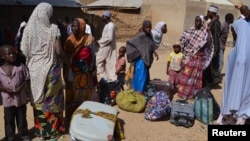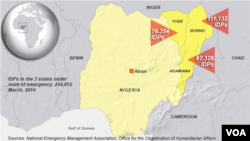ABUJA —
A new report shows that Nigeria now has the largest internally displaced population in Africa, and the third largest in the world. In recent years, hundreds of thousands of people fled Boko Haram insurgents in the northeast but some families are returning to their homes, saying there is nowhere safe for them to hide.
Last month, reports circulated that residents of Kala Balge, a farming community in northeastern Nigeria, had killed 200 Boko Haram insurgents. About ten days ago, militants came back for revenge.
Abba Abdulmumini, a Kala Balge community leader, said they stormed 10 villages in the area, burning homes, killing at least four people and sending thousands of people running for their lives.
“The situation is quite pathetic. And it's like the Nigerian government is not willing to act. People are being killed like chickens,” said Abdulmumini.
He said with no security forces in the area people wanted to keep fighting, but they ran out of ammunition.
“The fighting power of the Boko Haram insurgents cannot be matched by the local weapons around. In fact, they have the heart to fight but they don’t have the weapons. They don’t have the arms,” said Abdulmumini.
Those who fled found no help in a makeshift camp by the Cameroon border. Emergency officials said the area was too dangerous for aid workers to access.
Some Kala Balge residents are now returning with their livestock, saying there was not enough grazing land on the other side of the border.
On top of that, the militants appear able to attack at any place and any time of their choosing. Last week about 350 people were killed in attacks on villages in Borno State, the heart of the insurgency, and one of three Nigerian states that has been under emergency rule for more than a year.
A report released last week by the Norwegian Refugee Council and the Internal Displacement Monitoring Centre says there are about 3.3 million displaced people in Nigeria, making it the third-largest displaced population in the world after Syria and Colombia.
Emmanuel Ogebe is a Nigeria expert with the Jubilee Campaign, a Christian human rights organization. He said the government has done little to help the displaced.
“The atrocities are continuing to worsen and the government of Nigeria needs to have a strategic human impact mitigation plan, which we don’t see," said Ogebe.
Khalifa Dikwa, a political analyst and former lecturer at the University of Maiduguri, said for civilians fleeing their homes, the danger was often not just from the insurgents.
He said many people ran because they were caught in the crossfire.
“Both the security agents and the Boko Haram kill them. They are not protected,” said Dikwa.
Abdulmumini said villagers, who returned to Kala Balge, said Boko Haram tried to take over the community after the attacks, offering to act as a de facto government. They also went house-to-house confiscating weapons.
Villagers said they didn’t want to publicly discuss Boko Haram, even anonymously, for security reasons. In the past five years, the radical group has killed thousands of people, and kidnapped hundreds of others including more than 200 schoolgirls that have been held captive for nearly two months.
(Ardo Hazzad contributed to this report from Bauchi, Ibrahima Yakubu contributed to this report from Kaduna.)
Last month, reports circulated that residents of Kala Balge, a farming community in northeastern Nigeria, had killed 200 Boko Haram insurgents. About ten days ago, militants came back for revenge.
Abba Abdulmumini, a Kala Balge community leader, said they stormed 10 villages in the area, burning homes, killing at least four people and sending thousands of people running for their lives.
“The situation is quite pathetic. And it's like the Nigerian government is not willing to act. People are being killed like chickens,” said Abdulmumini.
He said with no security forces in the area people wanted to keep fighting, but they ran out of ammunition.
“The fighting power of the Boko Haram insurgents cannot be matched by the local weapons around. In fact, they have the heart to fight but they don’t have the weapons. They don’t have the arms,” said Abdulmumini.
Those who fled found no help in a makeshift camp by the Cameroon border. Emergency officials said the area was too dangerous for aid workers to access.
Some Kala Balge residents are now returning with their livestock, saying there was not enough grazing land on the other side of the border.
On top of that, the militants appear able to attack at any place and any time of their choosing. Last week about 350 people were killed in attacks on villages in Borno State, the heart of the insurgency, and one of three Nigerian states that has been under emergency rule for more than a year.
A report released last week by the Norwegian Refugee Council and the Internal Displacement Monitoring Centre says there are about 3.3 million displaced people in Nigeria, making it the third-largest displaced population in the world after Syria and Colombia.
Emmanuel Ogebe is a Nigeria expert with the Jubilee Campaign, a Christian human rights organization. He said the government has done little to help the displaced.
“The atrocities are continuing to worsen and the government of Nigeria needs to have a strategic human impact mitigation plan, which we don’t see," said Ogebe.
Khalifa Dikwa, a political analyst and former lecturer at the University of Maiduguri, said for civilians fleeing their homes, the danger was often not just from the insurgents.
He said many people ran because they were caught in the crossfire.
“Both the security agents and the Boko Haram kill them. They are not protected,” said Dikwa.
Abdulmumini said villagers, who returned to Kala Balge, said Boko Haram tried to take over the community after the attacks, offering to act as a de facto government. They also went house-to-house confiscating weapons.
Villagers said they didn’t want to publicly discuss Boko Haram, even anonymously, for security reasons. In the past five years, the radical group has killed thousands of people, and kidnapped hundreds of others including more than 200 schoolgirls that have been held captive for nearly two months.
(Ardo Hazzad contributed to this report from Bauchi, Ibrahima Yakubu contributed to this report from Kaduna.)













